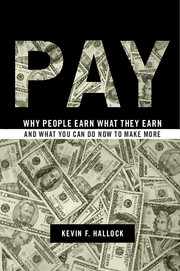Book contents
- Frontmatter
- Contents
- Figures
- Tables
- Acknowledgments
- PART I HOW HARD CAN THIS BE?
- PART II HOW ORGANIZATIONS SET PAY STRUCTURE AND WHY
- PART III HOW PEOPLE ARE PAID CAN MEAN AS MUCH AS HOW MUCH THEY ARE PAID
- 9 Evaluating Performance, Incentives, and Incentive Pay
- 10 Stock and Stock Options
- 11 Pay Mix
- 12 International Compensation
- 13 Compensation in Nonprofit Organizations
- PART IV WHAT YOU CAN DO TO MAKE MORE AND CONCLUDING COMMENTS
- Notes
- References
- Index
9 - Evaluating Performance, Incentives, and Incentive Pay
from PART III - HOW PEOPLE ARE PAID CAN MEAN AS MUCH AS HOW MUCH THEY ARE PAID
Published online by Cambridge University Press: 05 October 2012
- Frontmatter
- Contents
- Figures
- Tables
- Acknowledgments
- PART I HOW HARD CAN THIS BE?
- PART II HOW ORGANIZATIONS SET PAY STRUCTURE AND WHY
- PART III HOW PEOPLE ARE PAID CAN MEAN AS MUCH AS HOW MUCH THEY ARE PAID
- 9 Evaluating Performance, Incentives, and Incentive Pay
- 10 Stock and Stock Options
- 11 Pay Mix
- 12 International Compensation
- 13 Compensation in Nonprofit Organizations
- PART IV WHAT YOU CAN DO TO MAKE MORE AND CONCLUDING COMMENTS
- Notes
- References
- Index
Summary
When I teach managers or students about compensation, one of the first questions I ask is how many in the room have been professional cucumber pickers? And I slowly raise my own hand. As of yet, I have not met anyone in any of these settings who, like me, has been a professional cucumber picker. I grew up near farms in western Massachusetts and most of the other kids and I worked on the farms picking cucumbers that were processed and sold as pickles. Of course, this is a ridiculous, albeit true, example, but it highlights some important points in compensation design and strategy.
An Example: Picking Cucumbers
I then ask the group their opinion about the best way to pay a person who picks cucumbers. Many say “by the cucumber” or “by the pound” – the traditional piece rate idea. They say that this is the best method because “performance” matters and that those who pick more can be rewarded for their efforts and that it must be simple to just weigh the cucumbers. It turns out that paying cucumber pickers by the pound of cucumbers picked would be a disaster! Large cucumbers are nearly worthless (they can only be used for relish and the world only needs so much relish; in my own opinion, the world could do with a little less). Workers could just let the cucumbers grow and grow and pull out 2.5 pounders; big, heavy, and worthless. So this then leads to all kinds of additional suggestions – by the week, by the hour, based on individual performance, based on group performance, and so forth. It turns out that most cucumber pickers in western Massachusetts are paid by the hour. Why?
- Type
- Chapter
- Information
- PayWhy People Earn What They Earn and What You Can Do Now to Make More, pp. 111 - 124Publisher: Cambridge University PressPrint publication year: 2012
- 1
- Cited by



